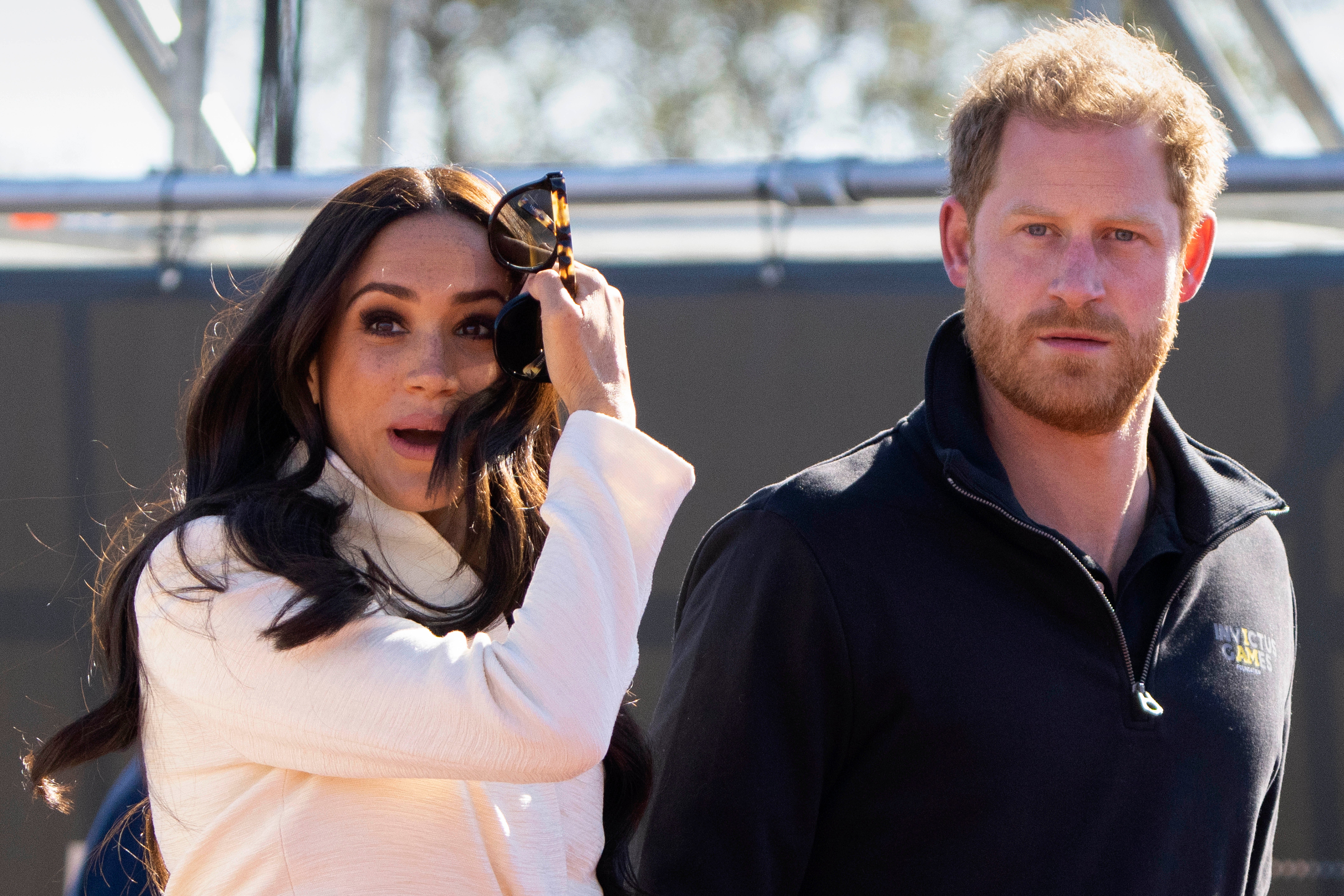Hollywood flops: How Harry and Meghan’s ‘Sussex Inc’ dream soured
The world’s most famous royal couple arrived in America to a flurry of megabucks deals and media partnerships, writes Samuel Fishwick. But just three years on, amid a slew of high profile snubs and big deal flops, their ‘Sussex Inc’ brand power is slowly coming apart at the seams...


When Harry met Meghan, the world saw Sussex Inc coming. Their wedding alone – a beautiful biracial American actress from downtown Los Angeles marrying the world’s favourite boy prince, like a 21st Century fairytale come to life – generated an estimated £1bn for the UK economy (including an additional £300 million in travel and accommodation spent by foreign tourists and £50 million spent on merchandise such as coins, dish cloths and clothing).
Just 18 months later they gave up their royal titles and moved to America, where the question wasn’t how much they’d make, but how quickly they’d outearn the Queen.
Now, the fall of their California media empire threaten to be as dramatic as its awesome rise, with a fallout more toxic than Megxit and a sting in the tail just as painful as Harry’s bust-up with William. “F*** them, the grifters,” said Spotify executive Bill Simmons as the streaming giant pulled the plug on their reported $20m (£15m) deal to produce podcasts last week after two-and-a-half years.
Sources for The Wall Street Journal suggest the couple haven’t met the requisite benchmarks to receive the full payout from their deal – they produced just 12 episodes of their Archetypes podcast. In a front page story this weekend, the newspaper sounded the death knell on their future ambtions with a story headlined ‘Harry and Meghan Flop in Hollywood’.
One issue was securing guests. The Journal reported that Meghan had written a personal letter to Taylor Swift asking her to be a guest on her podcast, which was turned down. This comes despite superstar singer having previoulsy led an on-stage singalong with Prince William and Jon Bon Jovi.
Multiple insiders reportedly told PodNews that some of Meghan’s interviews were conducted by other Archetypes staffers, with Meghan’s questions edited in later.
It is the kind of American horror story that can torpedo the valuation of even the most reputable blue chip company – in short: a branding nightmare. Bloomberg reported on a series of ideas floated by the Duke of Sussex to Spotify’s production executives so bizarre you’d be hard-pressed to make them up: Harry would interview a procession of controversial guest, such as Vladimir Putin, Mark Zuckerberg and Donald Trump, about their early formative years and how those experiences of childhood trauma resulted in the adults they are today.
Where this now leaves the value of the Sussex brand is the billion-dollar question. A chilling effect on a brand that was only recently deemed a commercial juggernaut would be, if not disastrous, certainly unhelpful for a couple with an estimated personal fortune of £30m to fall back on. In Montecito, that’s peanuts.
Their short time in California has been a roller coaster. When the Sussexes first moved, even they must have pinched themselves at the paydays that promptly fell their way. Six months in, they were snapped up by Netflix for a reported $100m five-year deal to produce documentaries, docu-series, films, scripted shows and children’s programming. They were courted by Disney and Apple. Soon after, Spotify came calling.
America – and the world – could not get enough of them. Meghan, the Duchess of Sussex, revealed in a deeply personal essay in The New York Times the story of her own miscarriage, a brave and painful moment that touched millions who suffered in silence. Some 17.1m viewers tuned in to watch that infamous interview with Oprah Winfrey on a garden sofa.
Harry signed a reported £33m, four-book deal with Penguin Random House. His tell-all memoir, Spare, sold 3.2m copies worldwide. The States had fallen for them hard. “It’s because they chose America,” wrote The New York Times’s Pamela Paul. “The fact that the Sussexes ditched a country they characterise as anti-immigrant, overrun with racists and burdened by the legacy of colonialism makes Americans feel better about their own country, which also (whoops) might be described as anti-immigrant, overrun with racists and burdened by the legacy of colonialism. But Harry and Meghan see America as a haven.”
During lockdown, as streaming behemoths like Netflix and Spotify raked in record profits with eyeballs glued to screens even as productions were put on pause, the marketing potential of the Sussex brand was obvious. Young and attractive, with megawatt smiles and charisma to burn, a soldier and a Hollywood star, both were also campaigners for good causes and eloquent on subjects like social justice and mental health.
They had a story that people could sell: upwardly mobile super-parents, putting Archie and Lilibet above even their own family (Harry famously flew back from King Charles’s coronation before the day had finished to make it home for his son’s birthday; Meghan missed the coronation altogether). They wanted to be just like us. Americans wanted to be just like them. And the Sussexes were serious about their messaging. They hired the services of the 70-year-old Rebecca Mostow, the Beckhams’ former aide, to help them “run their lives”. Then they hired Miranda Barbot, who was part of the team behind Obama's re-election in 2012, to “transform their image”. Then they hired Liz Garbus, the Oscar-nominated Handmaid’s Tale director who has had a 25-year career working on projects about oppressed women, to help them tell their tale on Netflix.
The problem, when the world reopened, was delivery. The global arms race to restart production went into overdrive even as those company’s bank balances took a nosedive. Rumours have dogged the Sussexes that they have simply failed to keep up with demand.
There was more trouble on the supply side. After three years, the careful drip-feed – and semi-regular deluge – of tell-all moments left the Sussexes short of anything new to say. “Does Prince Harry have any revelations left to share?”, asked New York Magazine pointedly in March, as he appeared on The Late Show With Stephen Colbert twice within a month.
When you have already told the world about doing ’shrooms at Courteney Cox’s house, losing your virginity in a field, and watching Meghan Markle’s sex scenes in Suits, does the revelation of your favourite sandwich (“a cheese and ham toastie with Dijon mustard on top”) make the viewer sit up and take notice?
The blows have kept coming. According to reports, the Duchess of Sussex had recently been lined up for a role with the fashion house Dior – having hired powerhouse agent Ari Emanuel, the charismatic chief of talent agency William Morris Endeavor, to reinvigorate her reputation. But a spokesman for Dior denied there had been any recent contact with Meghan, and insisted no contract negotiations had been touted.
Meanwhile in Britain, public opinion of the Duchess of Sussex in Britain has fallen to an all-time low, a new YouGov poll suggests – not that Britain’s chattering classes hold much sway across the Atlantic. But labels like “grifter” that can stick.
Prince Harry has led a campaign against the tabloid press in the UK, but the couple have faced some of their harshest criticism on social media, rather than the red-top titles they rail against. Meghan has previously said she now avoids social media for her own “self preservation” following abuse.
It is a huge shame. The Sussexes have shown themselves to be impressive storytellers with a talent for reaching audiences that others can’t. It is no exaggeration to say that, along with the then Cambridges, they changed the global conversation on mental health, advancing the narrative by decades. The Royal Foundation’s Heads Together initiative, working with the NHS, remains a golden benchmark for royal public service.
The Archetypes podcast simply failed to deliver the same oomph. Conversations with Serena Williams and Mariah Carey carried far less cut through as they sought to explore “the boxes women have been placed into for generations: boxes like ‘diva,’ ‘crazy,’ ‘the b-word,’ ‘slut.’”
Ideas for following up their tell-all Netflix interviews have been hard to find. According to the Wall Street Journal, the couple suggested other projects which never took off, including a sitcom pitched as ‘Emily in Paris’ but starring a man in the lead role, and a show about gay characters that was reportedly similar to ‘Heartstopper’.
It is an unhappy position that they now find themselves in. As the Scottish journalist Alex Massie noted in his Substack newsletter, Harry “has crossed to the other side with no prospect of return”, like a stranded Cold War defector. To his new paymasters, American television, he is useful for as long as his secrets are relevant and he is willing to offer them up: he will be squeezed until every last drop of gossip or innuendo has been wrung from him. Then, all that’s left is “the sad half-life of the exile, mooning around California, pleading for relevance and knowing, deep down, that it’s all downhill from here”.
Ironically, it was not long ago that The Duke of Sussex spoke out the joys of quitting your job. Perhaps he has the mental resilience to take his Spotify sacking as a blessing. But the backsliding of a brand, like bankruptcy, has a funny way of creeping up on you: gradually, then suddenly.





Join our commenting forum
Join thought-provoking conversations, follow other Independent readers and see their replies
Comments